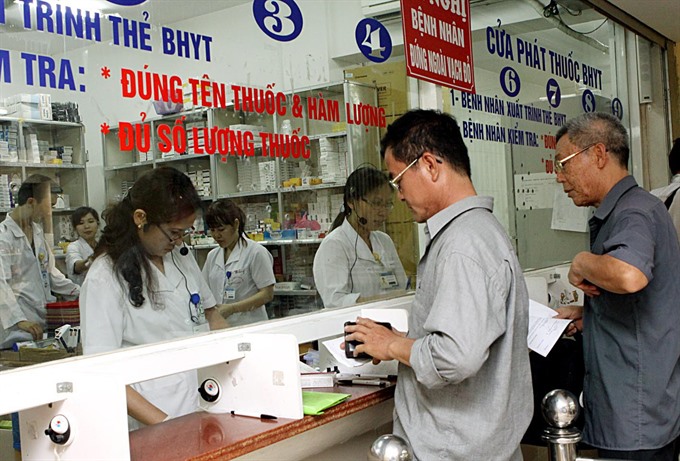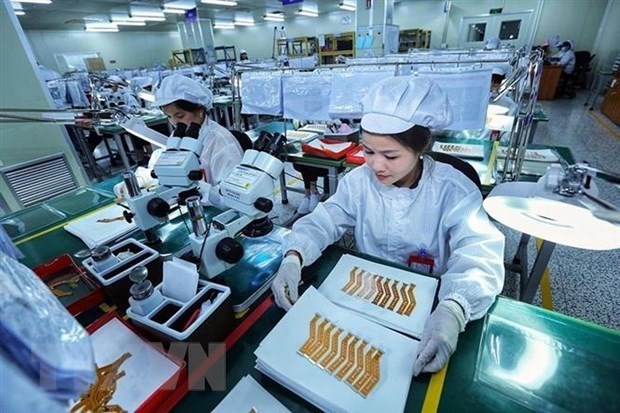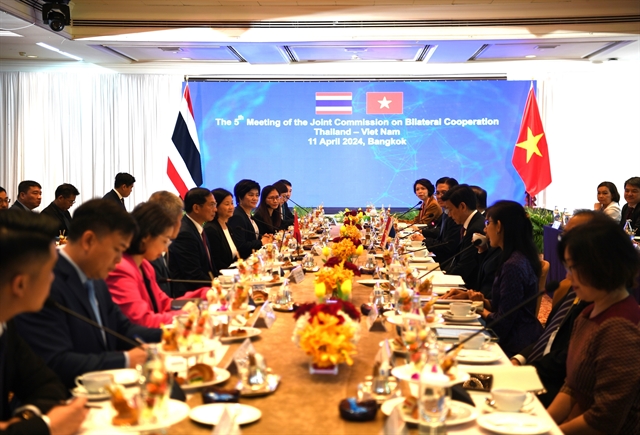

The Ministry of Health (MoH) and Việt Nam Social Security are working on a bidding mechanism that they expect will reduce money spent on medicines procured under the national health insurance scheme by 10-15 per cent.
 |
| A pharmacy in Ha Noi. A new bidding mechanism for medicines covered by the national health insurance scheme is expected to reduce medicine prices by 10-15 per cent, but several experts are worried it might prove counter productive. VNA/VNS Photo Dương Ngọc |
HÀ NỘI – The Ministry of Health (MoH) and Việt Nam Social Security are working on a bidding mechanism that they expect will reduce money spent on medicines procured under the national health insurance scheme by 10-15 per cent.
However, several experts have expressed misgivings about what they see as an excessive focus on cost-cutting that could compromise the quality of healthcare provided to insurance card holders.
The Government has asked that the new mechanism is put in place by 2018.
A trial launched earlier last month invited bids for 22 kinds of branded and generic drugs used in cancer treatment, said Nguyễn Trí Dũng, director of the National Centralised Drugs Procurement Centre (NCDPC).
The total price of the bid-winning drugs this time was lower by VNĐ590 billion (US26.2 million) over last year, he added.
Đỗ Văn Đông, deputy head of the Health Ministry’s Drug Administration, said centralised bidding for medicines was necessary for many reasons.
“First, it would help reduce costs during the bidding preparation process. Drug companies will only have to prepare one package of bidding documents instead of many, and since the value of the bid-winning package will be huge, the cost of the bid-winning drugs would be reduced. This, in turn, would help ensure stability for the health insurance fund.” he added.
According to a newly released information by Việt Nam Social Insurance (VSI), the nation’s health insurance fund is set to struggle with a large deficit of more than VNĐ10 trillion (US$434.8 million) this year.
Dũng of the NCDPC said that previously, when bids were organised separately, there were cases when prices of bid-winning drugs were different in different localities. The new mechanism would solve this problem, he said.
Lê Thành Công, deputy director of the Health Ministry’s Department of Planning and Finance, said the method and criteria for selecting tenders have been regulated precisely in Circular 11/2016/TT-BYT.
He said this would assess product quality of drug suppliers, prices and check other criteria as well.
“This method would combine both technical assessment and pricing assessment. Thus bid-winning drugs suppliers will not just be those offering lowest prices.
“With transparency in the pricing of drugs under the bidding process we can rest assured that the bid-winning drugs will be of high quality and reasonably priced,” Công said.
Dũng said that all drugs allowed to be sold in the domestic market by the Việt Nam Drug Aministration must have proof of quality and effectiveness. All drugs under the bidding process must be assessed for quality before anything else, he added.
Uncertain results
However, several officials and experts have expressed doubt that the new mechanism would prove effective.
Nguyễn Duy Thuận, deputy director of HCM City’s Health Economic Research and Hospital Administration Institute, said that when people care mostly about how prices of bid-winning drugs can be reduced, things can get one-sided.
“Doctors have another view. They care more about how effective treatment is,” he said.
For instance, if the price of a drug was lower, but the treatment time is longer, the economic benefit would be limited.
“If the prices of drugs are higher, but they take less time to heal, will the total healthcare cost for the society reduce or increase,” he asked. This would be especially true for expensive new generation drugs.
Thuận felt that the current selection criteria for bid-winning drugs focused only on drug prices and not on the total social costs for a patient.
“Social cost includes health checks, payment for doctors and nurses, medical machines, hospital stay… Drugs cost would only account for 10 per cent of all these charges,” he said.
While Health Ministry representatives have repeatedly assured that bid-winning drugs always meet quality criteria, National Assembly deputy Phạm Khánh Phong Lan was not fully convinced.
Lan, who used to be the deputy director of the HCM City’s Health Department, said all technical criteria in current documents on bidding for drugs were too general.
She felt that the quality requirements were not strict enough. “The most important criterion, which is treatment effectiveness, is often ignored,” she said.
Lan agreed that a centralised bidding mechanism was essential for proper management of drugs prices, but technical requirements and quality criteria must be clearly and strictly stated, she said.
Nothing like it
“There’s nothing like high quality at low prices. Take the case of VN Pharma’s H-Capita. The planned price was set at VNĐ66,000 and VN Pharma won the bid at VNĐ31,000. What was the result? If we only prefer low prices, it would create loopholes for low quality drugs.”
A pharmacist who wanted to remain unnamed said she shared Lan’s opinion, adding that if the Health Ministry wanted to cut costs, it should consider other solutions.
Cutting management expenses, enhancing application of new technologies, diversifying health insurance schemes are other possible options, she said.
“If we just purse low priced healthcare, we can’t talk about high quality treatment.” --VNS









